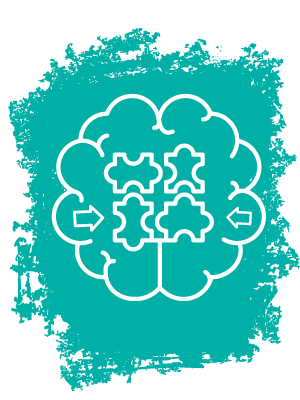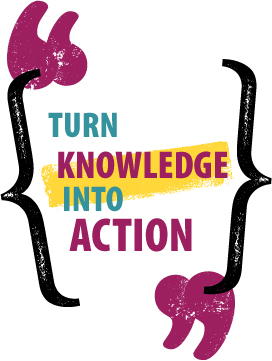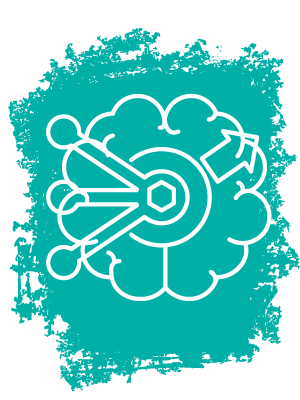
Self-Efficacy
Self-efficacy is confidence in the ability to exert control over your own motivation, behavior, and social environment.
Research has shown that people with a high level of self-efficacy are more likely to engage in vocational rehabilitation activities, tend to perform better in work environments, and be employed longer.
As a vocational rehabilitation professional working to support job-seekers with disabilities find and maintain quality employment, it’s important to consider job-seekers’ level of self-efficacy and its impact on how they approach goals, tasks, and challenges.
Goals of Self-Efficacy Training
Give job-seekers opportunities to strengthen their confidence in their ability to exert control over their motivation, behavior, and social environment by:
- Providing counseling that recognizes
- Incorporating counseling on self-efficacy in the career exploration process, including:
- Developing the ability to connect with others
- Exploring family support for employment goals
- Providing counseling around adapting to disability
- Gaining knowledge about fatigue reduction and employment accommodations
What Does Self-Efficacy Look Like?
People with a high level of self-efficacy:
- Make a greater effort to complete tasks and persevere in their efforts
- View challenging problems as tasks to be mastered
- Develop a deeper interest in the activities in which they participate
- Form a stronger sense of commitment to their interests and activities
- Recover quickly from setbacks and disappointments
- Are more likely to engage in healthy behaviors
People with a low level of self-efficacy:
- Are less likely to complete tasks and may give up easily
- Avoid challenging tasks
- Believe that difficult tasks and situations are beyond their capabilities
- Focus on personal failings and negative outcomes
- Quickly lose confidence in personal abilities
- Are less likely to engage in healthy behaviors
Increasing Self-Efficacy through Rehabilitation Counseling
Beliefs around self-efficacy begin forming early in life as children deal with a wide variety of experiences, tasks, and situations. However, the growth of self-efficacy does not end during youth but continues to evolve throughout life as people acquire new skills, experiences, and understanding.1
Vocational rehabilitation professionals can support job-seekers by providing access to experiences and feedback that strengthen self-efficacy. But first, it’s helpful to understand if your customer has a low or high level of self-efficacy, or somewhere in between.
Assessing Self-Efficacy
There are a number of different scales that are used to evaluate an individual’s level of self-efficacy, including the General Self-Efficacy Scale (GSE) and the Self-Efficacy Questionnaire. For a quick, informal assessment of a job-seekers level of efficacy, ask the following questions:
- Do you feel like you can handle problems if you are willing to work hard?
- Are you confident in your ability to achieve your goals?
- Do you feel like you can manage unexpected events that come up?
- Are you able to bounce back fairly quickly after stressful events?
- Do you feel like you can come up with solutions when you are facing a problem?
- Do you keep trying even when things seem difficult?
- Are you good at staying calm even in the face of chaos?
- Do you perform well even under pressure?
- Do you tend to focus on your progress rather than getting overwhelmed by all you still have to do?
- Do you believe that hard work will eventually pay off?
If the answer is yes to many or most of these questions, then chances are good the job-seeker has a fairly high level of self-efficacy.3 If the answer is no to many or most, it’s likely they would benefit from support to increase their self-efficacy.
Strategies
Since people with a high level of self-efficacy are more likely to engage in vocational rehabilitation activities, tend to perform better in work environments, and be employed longer, it’s important to have strategies on hand to support job-seekers increase their self-efficacy. Fry et al., (2020) suggests these strategies:
Other Strategies to Increase Self-Efficacy
Trauma-Informed Care
A person coping with the impacts of trauma may have less confidence in their ability to control their motivation, behavior, and social environment. Trauma Informed Care is a strategy used to better engage with those who are struggling with the impacts of trauma and support them as they grow and heal. It shifts the focus from “what is wrong with you?” to “what has happened to you?”
Motivational Interviewing
Motivational interviewing is an evidence-based counseling method used to help people resolve ambivalence and develop internal motivation to change behavior. It supports people to change behaviors that are keeping them from making positive life decisions, and helps them identify goals and ways to achieve them. More about Motivational Interviewing.
Cultural Awareness
An individual’s cultural identity impacts everything from their beliefs to their behaviors. Acknowledging and demonstrating awareness of and respect for different aspects of a person’s culture strengthens the therapeutic rapport between a vocational rehabilitation professional and job-seeker. This may lead to an increased willingness from the job-seeker to engage in activities that could lead to a high level of self-efficacy. More about cultural awareness and identifying subconscious bias.
Resources
Following are some tools and resources to learn even more about this topic.
Featured Resources

Self Efficacy and Why Believing in Yourself Matters
A helpful article in Verywell Mind's Personality Psychology section by Kendra Cherry.

What is Self-Efficacy Theory in Psychology?
By Courtney E. Ackerman, MSc. Self-efficacy is not self-image, self-worth, or any other similar construct. Keep reading! What is Self-Efficacy Theory in Psychology...
More Resources
- Bandura, A. (1994). Self-efficacy. In V. S. Ramachaudran (Ed.), Encyclopedia of human behavior (Vol. 4, pp. 71-81). New York: Academic Press. (Reprinted in H. Friedman [Ed.], Encyclopedia of mental health. San Diego: Academic Press, 1998).
- Predicting vocational self-efficacy of unemployed adults with disabilities
- Measuring Self-Efficacy with Scales and Questionnaires by Leslie Riopel, MSc.
- Psycap 101: Your Guide to Increasing Psychological Capital by Birgit Ohlin, MA, BBA
Sources
1 Luszczynska, A. & Schwarzer, R. (2005). "Social cognitive theory". In M. Conner & P. Norman (eds.).
2 Predicting health behaviour (2nd ed. rev. ed.). Buckingham, England: Open University Press. pp. 127–169




